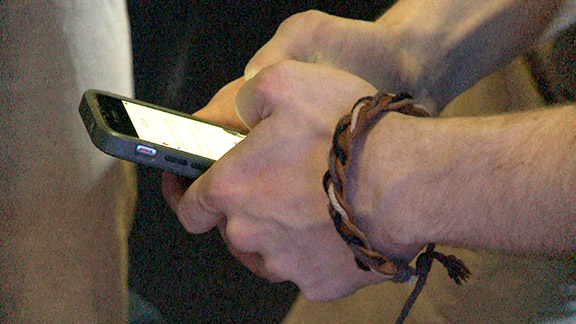- No posts where found
Digital dependency
By Alyssa Horrobin

The average user of technology spends 1.72 hours a day on social media and checks their smartphone 150 times a day. (Photo by Alyssa Horrobin)
In a time where technology is advancing and being consumed more than ever, it is important for people to set limits for themselves to avoid negative effects.
Some see too much of this consumption becoming an issue of mental health in children and teens.
The GECDSB is putting on its fifth year of mental health seminars for the community. There are three sessions each year in the county and the city. These are free for the community to attend and geared towards parents and teachers.
Tracey Rilett is the principal of A.V. Graham Public School and chair of the mental health seminar series committee. The topics presented each year are chosen by popular vote from people who attended the previous year’s sessions.
“We really want to reduce the stigma of mental health, and part of that is getting the conversation going,” said Rilett. “You can’t have the conversation without the education.”
The first seminar this year was on youth and children becoming addicted to the Internet and video games.
Jennifer Forfitt, problem gambling counsellor at Hotel Dieu Grace Healthcare Problem Gambling Services, said this is definitely becoming a more prevalent topic as the use of electronic devices increases throughout the community.
“Technology is definitely booming,” said Forfitt. “It’s very important to educate people on the pros and cons, the dangers and benefits of being able to partake in such technology.”
She said the use of technology and electronic devices is not necessarily good or bad, people just need to know how to use them appropriately and within certain limits.
For parents, this also means setting limits for their children’s use of electronics.
Trever Cannon is a self-employed house builder in Wallaceburg and father to three children. Cannon said he already sees signs of addiction to electronics in his oldest son, three-year-old Emerson.
“He will wet his pants while on his tablet because he’s so zoned in on it,” said Cannon. “I have to raise my voice or ask again if he’s on it.”
Cannon said he does his best to limit the amount of time spent on the tablet. Emerson has been using it for about a year and has watched TV since about one year old.
“You say as a parent ‘oh I’ll never let my kid watch TV’ but you will, it’s easier,” said Cannon. “So you have to limit their exposure.”
According to study.com, organizations such as the American Academy of Pediatrics and The Campaign for a Commercial Free Childhood recommend no television at all for children under the age of two.
CCFC was the company that issued a complaint against Baby Einstein in 2009 for making DVDs specifically geared towards babies aged two and under. Baby Einstein responded by offering a refund or exchange for CDs on all DVDs purchased in the previous five years.
Canon said he is not sure if his son’s addiction to technology will grow into something he uses for a job or something potentially dangerous or negative. He believes most things in life should be kept in moderation.
“We do talk about people using things in excess, but we don’t talk about how to use them responsibly or how to use them safely at all,” said Forfitt. “The more information we get out there, the better people can set limits for themselves or question what they’re doing.”
If you would like to know how you can have a say in the topics chosen for next year’s mental health seminars, contact the WECDSB.


